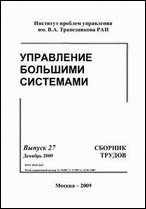|
Control in Social and Economic Systems
Computational aspects of digital economy
B. S. Dobronets, O. A. Popova
Siberian Federal University, Krasnoyarsk
Abstract:
The article discusses the main computational problems in the digital economy, primarily related to the processing and analysis of big data, the organization of computational processes and improving the accuracy of numerical procedures. The approach is based on the application of new methods of data aggregation based on computational probabilistic analysis, the use of probabilistic extensions and numerical operations on piecewise polynomial functions. One of the most important tasks of numerical modeling of big data is the calculation of functional dependencies. It is proposed to use functional regression on empirical distributions to identify dependencies in big data. New methods for modeling functional dependencies based on spline approximations are considered. To study and improve the accuracy of calculations, an approach based on the Runge rule and Richardson extrapolation is used. To organize the computing process, a recursive-parallel scheme is used, based on the properties of probabilistic extensions. This approach provides a technique for fast and reliable calculations in the conditions of large volumes of data for various types of uncertainty. As an example, the problem of assessing investment risks is considered. The probability density functions of factors such as net present value (NPV) and internal rate of return (IRR) are calculated.
Keywords:
digital economy, big data, computational probabilistic analysis, functional regression, Richardson extrapolation, risk assessment.
Received: December 24, 2019
Published: July 31, 2019
Citation:
B. S. Dobronets, O. A. Popova, “Computational aspects of digital economy”, UBS, 84 (2020), 114–129
Linking options:
https://www.mathnet.ru/eng/ubs1035 https://www.mathnet.ru/eng/ubs/v84/p114
|

| Statistics & downloads: |
| Abstract page: | 132 | | Full-text PDF : | 82 | | References: | 24 |
|




 Contact us:
Contact us: Terms of Use
Terms of Use
 Registration to the website
Registration to the website Logotypes
Logotypes








 Citation in format
Citation in format 